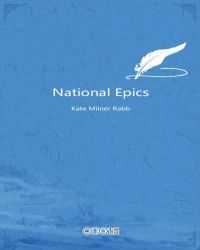THE DEATH OF YAJNADATTA.
您可以在百度里搜索“National Epics 艾草文学(www.321553.xyz)”查找最新章节!
THE DEATH OF YAJNADATTA.
The Raja Dasaratha was compelled to banish his favorite son Rama, immediately after his marriage to Sita, because his banishment was demanded by the Raja's wife Kaikeyi, to whom he had once promised to grant any request she might make. His grief at the loss of his son is described in this selection.
Scarce Rama to the wilderness had with his younger brother gone,
Abandoned to his deep distress, king Dasaratha sate alone.
Upon his sons to exile driven when thought that king, as Indra bright,
Darkness came o'er him, as in heaven when pales th' eclipsed sun his
light.
Six days he sate, and mourned and pined for Rama all that weary time.
At midnight on his wandering mind rose up his old forgotten crime.
His queen, Kausalya, the divine, addressed he, as she rested near:
"Kausalya, if thou wakest, incline to thy lord's speech thy ready ear.
Whatever deed, or good or ill, by man, O blessed queen, is wrought.
Its proper fruit he gathers still, by time to slow perfection brought.
He who the opposing counsel's weight compares not in his judgment cool,
Or misery or bliss his fate, among the sage is deemed a fool.
As one that quits the Amra bower, the bright Palasa's pride to gain
Mocked by the promise of its flower, seeks its unripening fruit in vain,
So I the lovely Amra left for the Palasa's barren bloom,
Through mine own fatal error 'reft of banished Rama, mourn in gloom.
Kausalya! in my early youth by my keen arrow, at his mark
Aimed with too sure and deadly truth, was wrought a deed most fell and
dark.
At length, the evil that I did, hath fallen upon my fated head,
As when on subtle poison hid an unsuspecting child hath fed;
Even as that child unwittingly hath made the poisonous fare his food,
Even so, in ignorance by me was wrought that deed of guilt and blood.
Unwed wert thou in virgin bloom, and I in youth's delicious prime,
The season of the rains had come,—that soft and love enkindling time.
Earth's moisture all absorbed, the sun through all the world its warmth
had spread,
Turned from the north, its course begun, where haunt the spirits of the
dead:
Gathering o'er all the horizon's bound on high the welcome clouds
appeared,
Exulting, all the birds flew round,—cranes, cuckoos, peacocks, flew and
veered.
And all down each wide-watered shore the troubled, yet still limpid
floods,
Over their banks began to pour, as o'er them hung the bursting clouds.
And, saturate with cloud-born dew, the glittering verdant-mantled earth,
The cuckoos and the peacocks flew, disputing as in drunken mirth.—
"In such a time, so soft, so bland, oh beautiful! I chanced to go.
With quiver and with bow in hand, where clear Sarayu's waters flow,
If haply to the river's brink at night the buffalo might stray,
Or elephant, the stream to drink,—intent my savage game to slay.
Then of a water cruse, as slow it filled, the gurgling sound I heard,
Nought saw I, but the sullen low of elephant that sound appeared.
The swift well-feathered arrow I upon the bowstring fitting straight,
Towards the sound the shaft let fly, ah, cruelly deceived by fate!
The winged arrow scarce had flown, and scarce had reached its destined
aim,
'Ah me, I'm slain,' a feeble moan in trembling human accents came.
'Ah, whence hath come this fatal shaft against a poor recluse like me,
Who shot that bolt with deadly craft,—alas! what cruel man is he?
At the lone midnight had I come to draw the river's limpid flood,
And here am struck to death, by whom? ah whose this wrongful deed of
blood?
Alas! and in my parents' heart, the old, the blind, and hardly fed,
In the wild wood, hath pierced the dart, that here hath struck their
offspring dead.
Ah, deed most profitless as worst, a deed of wanton useless guilt:
As though a pupil's hand accurs'd his holy master's blood had spilt.
But not mine own untimely fate,—it is not that which I deplore.
My blind, my aged parents' state—'tis their distress afflicts me more.
That sightless pair, for many a day, from me their scanty food have
earned;
What lot is theirs when I'm away, to the five elements returned?
Alike, all wretched they, as I—ah, whose this triple deed of blood?
For who the herbs will now supply,—the roots, the fruit, their
blameless food?'
My troubled soul, that plaintive moan no sooner heard, so faint and low,
Trembled to look on what I'd done, fell from my shuddering hand my bow.
Swift I rushed up, I saw him there, heart-pierced, and fallen the stream
beside,
The hermit boy with knotted hair,—his clothing was the black deer's
hide.
On me most piteous turned his look, his wounded breast could scarce
respire,
And these the words, O queen, he spoke, as to consume me in his ire:
'What wrong, O Kshatriya, have I done, to be thy deathful arrow's aim,
The forest's solitary son, to draw the limpid stream I came.
Both wretched and both blind they lie, in the wildwood all destitute,
My parents, listening anxiously to hear my home-returning foot.
By this, thy fatal shaft, this one, three miserable victims fall,
The sire, the mother, and the son—ah why? and unoffending all.
How vain my father's life austere, the Veda's studied page how vain,
He knew not with prophetic fear his son would fall untimely slain.
But had he known, to one as he, so weak, so blind, 't were bootless all,
No tree can save another tree by the sharp hatchet marked to fall.
But to my father's dwelling haste, O Raghu's son, lest in his ire
Thy head with burning curse he blast, as the dry forest tree the fire.
Thee to my father's lone retreat will quickly lead yon onward path,
Oh, haste his pardon to entreat, or ere he curse thee in his wrath.
Yet first that gently I may die, draw forth the barbed steel from hence,
Allay thy fears, no Brahmin I, not thine of Brahmin blood the offence.
My sire, a Brahmin hermit he, my mother was of Sudra race.'
So spake the wounded boy, on me while turned his unreproaching face.
As from his palpitating breast I gently drew the mortal dart,
He saw me trembling stand, and blest that boy's pure spirit seemed to
part.
As died that holy hermit's son, from me my glory seemed to go,
With troubled mind I stood, cast down t' inevitable endless woe.
That shaft that seemed his life to burn like serpent venom, thus drawn
out,
I, taking up his fallen urn, t' his father's dwelling took my route.
There miserable, blind, and old, of their sole helpmate thus forlorn,
His parents did these eyes behold, like two sad birds with pinions
shorn.
Of him in fond discourse they sate, lone, thinking only of their son,
For his return so long, so late, impatient, oh by me undone.
My footsteps' sound he seemed to know, and thus the aged hermit said,
'O Yajnadatta, why so slow?—haste, let the cooling draught be shed.
Long on the river's cooling brink hast thou been sporting in thy joy.
Thy mother's fainting spirits sink in fear for thee; but thou, my boy,
If aught to grieve thy gentle heart thy mother or thy sire do wrong,
Bear with us, nor, when next we part, on the slow way thus linger long,
The feet of those that cannot move, of those that cannot see the eye,
Our spirits live but in thy love,—oh wherefore, dearest, no reply?'
"My throat thick swollen with bursting tears, my power of speech that
seemed to choke,
With hands above my head, my fears breaking my quivering voice, I spoke:
The Kshatriya Dasaratha I, O hermit sage, 't is not thy son!
Most holy ones, unknowingly a deed of awful guilt I've done.
With bow in hand I took my way along Sarayu's pleasant brink,
The savage buffalo to slay, or elephant come down to drink.
"A sound came murmuring to my ear,—'twas of the urn that slowly filled,
I deemed some savage wild-beast near,—my erring shaft thy son had
killed.
A feeble groan I heard, his breast was pierced by that dire arrow keen:
All trembling to the spot I pressed, lo there thy hermit boy was seen.
Flew to the sound my arrow, meant the wandering elephant to slay,
Toward the river brink it went,—and there thy son expiring lay.
The fatal shaft when forth I drew, to heaven his parting spirit soared,
Dying he only thought of you, long, long, your lonely lot deplored.
Thus ignorantly did I slay your child beloved, O hermit sage!
Turn thou on me, whose fated day is come, thy all-consuming rage!'
He heard my dreadful tale at length, he stood all lifeless, motionless;
Then deep he groaned, and gathering strength, me the meek suppliant did
address.
'Kshatriya, 't is well that thou hast turned, thy deed of murder to
rehearse,
Else over all thy land had burned the fire of my wide-wasting curse.
If with premeditated crime the unoffending blood thou 'dst spilt,
The Thunderer on his throne sublime had shaken at such tremendous guilt.
Against the anchorite's sacred head, hadst, knowing, aimed thy shaft
accursed,
In th' holy Vedas deeply read, thy skull in seven wide rents had burst.
But since, unwitting, thou hast wrought that deed of death, thou livest
still,
O son of Taghu, from thy thought dismiss all dread of instant ill.
Oh lead me to that doleful spot where my poor boy expiring lay,
Beneath the shaft thy fell hand shot, of my blind age the staff, the
stay.
On the cold earth 'twere yet a joy to touch my perished child again,
(So long if I may live) my boy in one last fond embrace to strain
His body all bedewed with gore, his locks in loose disorder thrown,
Let me, let her but touch once more, to the dread realm of Yama gone.'
Then to that fatal place I brought alone that miserable pair;
His sightless hands and hers I taught to touch their boy that slumbered
there.
Nor sooner did they feel him lie, on the moist herbage coldly thrown,
But with a shrill and feeble cry upon the body cast them down.
The mother as she lay and groaned, addressed her boy with quivering
tongue,
And like a heifer sadly moaned, just plundered of her new-dropped young:
"'Was not thy mother once, my son, than life itself more dear to thee?
Why the long way thou hast begun, without one gentle word to me?
One last embrace, and then, beloved, upon thy lonely journey go!
Alas! with anger art thou moved, that not a word thou wilt bestow?'
"The miserable father now with gentle touch each cold limb pressed,
And to the dead his words of woe, as to his living son addressed:
'I too, my son, am I not here?—thy sire with thy sad mother stands;
Awake, arise, my child, draw near, and clasp each neck with loving
hands.
Who now, 'neath the dark wood by night, a pious reader shall be heard?
Whose honeyed voice my ear delight with th' holy Veda's living word?
The evening prayer, th' ablution done, the fire adored with worship
meet,
Who now shall soothe like thee, my son, with fondling hand, my aged
feet?
And who the herb, the wholesome root, or wild fruit from the wood shall
bring?
To us the blind, the destitute, with helpless hunger perishing?
Thy blind old mother, heaven-resigned, within our hermit-dwelling lone,
How shall I tend, myself as blind, now all my strength of life is gone?
Oh, stay, my child, oh. Part not yet, to Yama's dwelling go not now,
To-morrow forth we all will set,—thy mother and myself and thou:
For both, in grief for thee, and both so helpless, ere another day,
From this dark world, but little loath, shall we depart, death's easy
prey!
And I myself, by Yama's seat, companion of thy darksome way,
The guerdon to thy virtues meet from that great Judge of men will pray.
Because, my boy, in innocence, by wicked deed thou hast been slain,
Rise, where the heroes dwell, who thence ne'er stoop to this dark world
again.
Those that to earth return no more, the sense-subdued, the hermits wise,
Priests their sage masters that adore, to their eternal seats arise.
Those that have studied to the last the Veda's, the Vedanga's page,
Where saintly kings of earth have passed, Nahusa and Yayati sage;
The sires of holy families, the true to wedlock's sacred vow;
And those that cattle, gold, or rice, or lands, with liberal hands
bestow;
That ope th' asylum to th' oppressed, that ever love, and speak the
truth;
Up to the dwellings of the blest, th' eternal, soar thou, best-loved
youth.
For none of such a holy race within the lowest seat may dwell;
But that will be his fatal place by whom my only offspring fell.'
"So groaning deep, that wretched pair, the hermit and his wife, essayed
The meet ablution to prepare, their hands their last faint effort made.
Divine, with glorious body bright, in splendid car of heaven elate,
Before them stood their son in light, and thus consoled their helpless
state:
'Meed of my duteous filial care, I've reached the wished for realms of
joy;
And ye, in those glad realms, prepare to meet full soon your dear-loved
boy.
My parents, weep no more for me, yon warrior monarch slew me not,
My death was thus ordained to be, predestined was the shaft he shot.'
Thus as he spoke, the anchorite's son soared up the glowing heaven afar,
In air his heavenly body shone, while stood he in his gorgeous car.
But they, of that lost boy so dear the last ablution meetly made,
Thus spoke to me that holy seer, with folded hands above his head.
'Albeit by thy unknowing dart my blameless boy untimely fell,
A curse I lay upon thy heart, whose fearful pain I know too well.
As sorrowing for my son I bow, and yield up my unwilling breath,
So, sorrowing for thy son shalt thou at life's last close repose in
death.'
That curse dread sounding in mine ear, to mine own city forth I set,
Nor long survived that hermit seer, to mourn his child in lone regret.
This day that Brahmin curse fulfilled hath fallen on my devoted head,
In anguish for my parted child have all my sinking spirits fled.
No more my darkened eyes can see, my clouded memory is o'ercast,
Dark Yama's heralds summon me to his deep, dreary realm to haste.
Mine eye no more my Rama sees, and grief-o'erborne, my spirits sink,
As the swoln stream sweeps down the trees that grow upon the crumbling
brink.
Oh, felt I Rama's touch, or spake one word his home-returning voice,
Again to life I should awake, as quaffing nectar draughts, rejoice,
But what so sad could e'er have been, celestial partner of my heart,
As Rama's beauteous face unseen, from life untimely to depart?
His exile in the forest o'er, him home returned to Oude's high town,
Oh happy those, that see once more, like Indra from the sky come down.
No mortal men, but gods I deem,—moonlike, before whose wondering sight
My Rama's glorious face shall beam, from the dark forest bursting
bright.
Happy that gaze on Rama's face with beauteous teeth and smile of love,
Like the blue lotus in its grace, and like the starry king above.
Like to the full autumnal moon, and like the lotus in its bloom,
That youth who sees returning soon,—how blest shall be that mortal's
doom."
Dwelling in that sweet memory, on his last bed the monarch lay,
And slowly, softly seemed to die, as fades the moon at dawn away.
"Ah, Rama! ah, my son!" thus said, or scarcely said, the king of men,
His gentle hapless spirit fled in sorrow for his Rama then,
The shepherd of his people old at midnight on his bed of death,
The tale of his son's exile told, and breathed away his dying breath.
Milman's Translation. National Epics


